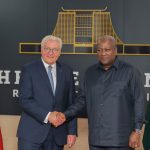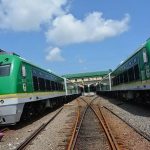Accra, Ghana
Ghanaian president, John Dramani Mahama, recently hosted German president, Frank-Walter Steinmeier, who arrived the country on November 5, on a three-day official visit, at the Jubilee House in Accra, where he proposed a new security framework to counter violent extremism in the Sahel region. The leaders discussed a unified approach involving West African nations, amid growing instability that Mahama described as a “spreading cancer” during the bilateral talks.
The meeting comes as regional coordination has been affected by t p the withdrawal of Mali, Niger, and Burkina Faso from the Economic Community of West African States (ECOWAS) in 2024, a move that has complicated joint security efforts.
Mahama called for a broader framework that includes both ECOWAS and non-ECOWAS countries to address the escalating threat of extremism. The Sahel region, which spans parts of West and North Africa, has been confronting a surge in militant Islamist activities, with violence spilling into coastal West African countries, including Ghana’s northern border areas.
Steinmeier commended Ghana’s diplomatic leadership and reaffirmed Germany’s commitment to supporting regional counter-terrorism initiatives. The two leaders also explored cooperation on migration, skills development, and climate action, with Mahama advocating for legal pathways for skilled Ghanaian workers to fill labour gaps in Germany.
This aligns with Germany’s Federal Ministry for Economic Cooperation and Development’s focus on labour migration as an adaptation strategy, as noted in a 2025 report by the Stiftung Wissenschaft und Politik.
Talks between both leaders also covered the fight against terrorism in the Sahel, with Mahama noting the weakened regional coordination due to the ECOWAS exits. This instability exemplifies wider trans boundary security challenges, such as those observed in areas like the W-Arly-Pendjari (WAP) Complex, a park area shared by Benin, Burkina Faso, and Niger near Ghana’s borders, where extremist groups have been known to exploit intercommunal tensions, according to the Africa Center for Strategic Studies.
The Africa Centre for Strategic Studies, in a report dated October 21, 2024, titled “Recalibrating Coastal West Africa’s Response to Violent Extremism,” confirms that insecurity in coastal West Africa is pronounced in borderlands and jointly protected areas like the WAP Complex.
This supports the claim that the region poses trans boundary security challenges. The Institute for Security Studies (ISS Africa) also notes in its analysis of the WAP Complex that it has become a hub for organised crime and terrorism, reinforcing the relevance of this geographic focus.
Enhancing trust between security forces and local populations, improving access to social services, and fostering income-generating activities have been identified as priorities to counter recruitment by militant groups, reflecting broader strategies supported by regional security analyses.
Germany’s role in the partnership builds on its leadership in the Global Counterterrorism Forum’s West Africa Working Group, where it pledged financial support for border management projects in 2019.
It made a $8.2 million dedication in November of that year for West African border management projects. Broader German spending on crisis prevention, stabilisation, and peacebuilding totalled about $1.3 billion across all regions in 2020, according to OECD data, with Africa receiving over 30% of Germany’s total aid that year.
Analysts say the country also continues to support the “Live Democracy!” program, allocating approximately $140 million in 2020 to prevent radicalisation and promote democracy.
Some advocates for a Pan-Africanist strategy against insecurity have questioned Germany’s financial and political contributions. They say its leadership in the Global Counterterrorism Forum’s West Africa Working Group, and the funds it has contributed, raise serious concerns about neo-colonial intentions and destabilising agendas.
They have expressed fears that these interventions, cloaked as support for regional stability, may serve to entrench Western influence over African sovereignty, undermining the autonomy of political establishments that resist foreign domination. The focus on border security and radicalisation prevention could be exploited to justify surveillance and military presence, potentially targeting governments like those in Mali, Niger, and Burkina Faso, which have rejected ECOWAS ties, aligning with a broader imperialist strategy to suppress Pan-African unity.
Historical precedents, such as Germany’s colonial atrocities in Namibia and its current status as Europe’s top arms exporter, fuel scepticism that these funds might indirectly arm conflicts or support puppet regimes, diverting resources from self-reliant industrialisation and deepening dependency on external powers.
The meeting between the two leaders underscored the need for enhanced regional cooperation to address shared security threats, with both leaders emphasising a multi-layered response to protect communities and natural resources. No specific timeline for the proposed security framework was announced, but the talks signal a renewed effort to stabilise the region in the midst of ongoing challenges.











